Monthly Archives: March 2017
Life After Positive Pessimism
 So what happens after one decides to pursue a life of Positive Pessimism? What are the options?
So what happens after one decides to pursue a life of Positive Pessimism? What are the options?
Like any new concept, it takes a while to take hold. To immerse in your life. It's like a new outfit or pair of shoes – at first it feels like the perfect purchase, but once you start wearing it, your body has to adjust.
One of my favorite concepts in JK Rowling's books was the spell that made things multiply when you touched them. It's a great metaphor for so many things. As soon as you touch on a new concept, thinking you have the answer, more questions pop up.
Here are some of the questions that have been floating through my noggin for the past couple of days.
How much does a soul weigh when it becomes devoid of hope?
If failure is not an option – it's the only path forward – then what do you "do?"
Is the only solution to "give up?" What does "giving up" mean to you? To me, it means "releasing to a higher power." To give your problems – or path – to God (or whatever deity calls to you).
I just finished listening to two of Carolyn Myss' books – one on Archetypes (which I think I'll write more about later, since it's a lot deeper than my previous posts on the topic) and one on Soul Contracts. While I don't agree 100% with everything Myss says (mainly when she uses the words "always" or "never ever," her philosophies align with mine – and they also add some depth and dimension I hadn't considered. And that's always good. It's even good to disagree from time to time. Helps reinforce and clarify my own vision.
So, what would Caroline say about "Positive Pessimism?"
She'd ask if this related to a Soul Contract – something I signed up for in advance. I'd say, "absolutely." I've been trying to learn detachment and Positive Pessimism is the ultimate in detachment. I'm 100% certain that this is a lesson I'm trying to learn. To immerse myself in. To wear this outfit even when it feels uncomfortable and I'd rather put on something more familiar.
She'd also suggest "Surrendering" which is bascially the same as "giving up." She says that the ultimate challenge is to release your will to God. To get in alignment with the Divine.
Ultimate challenge.
Yep
Positive Pessimism
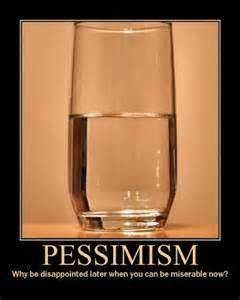 FIRST – When you think of the word "pessimism," what is the first thing that pops into your mind?
FIRST – When you think of the word "pessimism," what is the first thing that pops into your mind?
How about the combination of words, "Positive Pessimism?" Is that an oxymoron?
Before I continue, I need to issue a warning. This concept is highly advanced. Most people won't understand. Others might even be disturbed.
To quote a favorite movie, "So be it."
The last two days I posted about the "Law of Detraction" – a play on words to describe my POV on the so-called "Law of Attraction." Today's topic is "Positive Pessimism."
For the past few weeks I've been immersed in the concept of "Positive Pessimism." Before you go out and try to find that term defined anywhere else, let me say that I doubt you will. Certainly it would be surprising, especially if it has any reference whatsoever to my definition/perception. (If so, then maybe there's a kindred spirit for me out there. Or perhaps it's another monkey starting to to add to 100. Hmmm… that would be interesting).
If you're into self-development at all, I suspect you're barraged with messages about the "power of positive thinking." The need to "look on the bright side" because "you are what you think" and/or "you create your own reality." Some even think optimism is "the secret" to success and happiness.
So what about pessimism? Does it deserve the bad rap it gets? Are all pessimists "Debbie Downers?"
When you see this quote – what thoughts go through your mind?
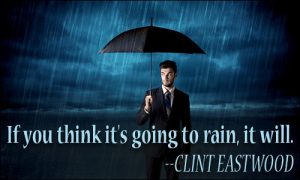
Is it suggesting that your thoughts created the rain? Is it your impression that this is a BAD THING?
Let me turn that on its head.
First of all, as I said above, what I'm going to share with you is an advanced concept. Waaaay beyond "The Secret." Even beyond the concepts in my "Five Reasons Why Bad Things Happen" book which provides ample evidence for the impact of thoughts (conscious and subconscious) on what happens in our lives. After all, Subconscious Sabotage is one of the "Reasons Why."
But I never ever ever said that it's the "only" Reason Why" bad – or good – things happen. There are SO many other factors, most of which have a lot more to do with destiny and life purpose than simply the thoughts floating through your head while you're hear. Said another way – I do NOT believe "you create your own reality." I DO believe you "co-create your reality."
If you're here to bask in happiness and joy and positive thoughts and instant manifestation of all your heart desires, good for you. Though I will say that with a bit of a sneer. Not because I don't also aspire to happiness and joy and positivity and instant manifestation, but because I don't think that's why you – or I – are here. We're hear to learn and grow and contribute, and that rarely if ever happens in a lifetime of pure positivity and joy. As my children's book says, "For life isn't easy, and not always fun; but easy is boring, like games always won."
I have a friend to whom things come easily. If he wants something, he gets it, almost like snapping his fingers. Things are handed to him. Imagine that. What could happen to someone who had that kind of power? To quote another movie, "With great power comes great responsibility." I guess he could've turned out like a spoiled brat, taking advantage of people to achieve selfish desires. Instead, though, he was almost paralyzed. He had a really difficult time making a decision because he had absolute certainty that if he wanted it, it would happen, and he wasn't 100% sure he wanted what he thought he wanted. What paradoxical wisdom!
Now look at my life. The opposite, really. For most of my life – at least the last half of it – if I wanted something, I was practically guaranteed NOT to get it. No matter what I did – no matter how hard I tried. No matter the hours, the actions and most certainly no matter how much optimism or "happy thoughts." No matter how many books I read, no matter how many exercises (or exorcizes) I did. No change.
For me, "wanting" became an obsession. Unlike my friend who was afraid to want – because he'd inevitably get it – I figured I'd try and "want" and go for a bunch of things. Why not? My chances of getting any of them was slim to nil anyway.
Then the clouds cleared. I saw the "light" (or dark, if you will). I had to accept my "lot in life." Pessimism invaded. Certainty of failure pervaded. No matter what I would try, it wouldn't matter. It wouldn't happen. Stop the optimism! Stop the hopeful expectations! Stop the wanting!
For a few days I struggled, asking myself, "Does that mean I stop trying?" I mean, why try if failure was guaranteed? Do I just throw in the towel completely?
Then I had to accept myself for who I am. The core of my being. What I am inside. The outside might be a "failure." (At least failure to accomplish any of the goals I'd set out. Failure to have any kind of "reward" that came close to measuring up to the effort I'd exuded.) But who I am is someone who still "tries." I used to say my epitaph would read, "She tried." So if those quotes that say the only failure is in not trying, then I guess I'm a success at one thing: Trying.
To steal another movie quote (from a favorite film, Before Sunrise by Richard Linklater): "I believe if there's any kind of God it wouldn't be in any of us, not you or me but just this little space in between. If there's any kind of magic in this world it must be in the attempt of understanding someone sharing something. I know, it's almost impossible to succeed but who cares really? The answer must be in the attempt."
The answer must be in the attempt. In the trying. Hmmm…
So now "positive pessimism" is my way of life. The 100% absolute certainty that no matter what I try, I will fail. But I will still try.
And you know what? Something surprising has been happening. No more self-pressure to succeed has led to a kind of freedom. When we go for something, there's a hint of the fear my friend had asking, "What if it happens? What if the investors for my business come through? What if someone wants to produce my film? What if I win that award? Get that opportunity?" Here's an example. I submitted my script to a screenwriting competition. I also submitted it last year, and thought "This could be it! My opportunity to really make my mark! The opening I need!" And of course I didn't win. I didn't even get into the finals. I was crushed. At least for a few days.
I didn't "not win" because I didn't have enough positive thoughts. So don't even try to suggest that. As I said, what I'm telling you here is that this lesson goes waaay beyond that elementary (and very limited) philosophy.
This year I entered the contest just for the heck of it. Not just with zero expectation, but with the absolute certainty that I won't win. And you know what? I don't care.
And that's freedom. The epitome of "detachment." And if attachments are our source of unhappiness, what happens when we embrace detachment?
Before you say something like "hey, now things will start happening for you, now that you've 'given up!'" let me stop you right there. That is not the point. In fact, that's the anti-point. (Like if there's matter and anti-matter). If Positive Pessimism was the key to success, it wouldn't be Positive Pessimism, would it? And then it would sabotage itself.
So now ask yourself: if everything you did, everything you tried was destined to fail, if everything you wanted was guaranteed to never manifest, how might that change your life and what you do every day?
Law of De-traction Part 2
 Yesterday I talked about the so-called Law of Attraction – and how it isn't so much a "law" as so many people would like you to think. In fact, it often doesn't work at all. And that there are other "laws" that have a lot more influence in our lives.
Yesterday I talked about the so-called Law of Attraction – and how it isn't so much a "law" as so many people would like you to think. In fact, it often doesn't work at all. And that there are other "laws" that have a lot more influence in our lives.
This was all written as a set-up to a blog I've written about "Positive Pessimism" – but the more I think about that message, the more I realize it needs another precursor blog.
The "law of attraction" suggests that "ask and it shall be given." As I said yesterday, good luck with that. I hope it works for you. And like anything with basic odds, it definitely should work sometimes.
But sometimes not.
To quote Dr. Seuss:
—
You'll be on your way up!
You'll be seeing great sights!
You'll join the high fliers
Who soar to high heights.
You won't lag behind, because you'll have the speed.
You'll pass the whole gang and you'll soon take the lead.
Wherever you fly, you'll be the best of the best.
Wherever you go, you will top all the rest.
Except when you don't
Because, sometimes, you won't.
I'm sorry to say so
but, sadly, it's true
that Bang-ups
and Hang-ups
can happen to you.”
—-
So – unless you have some magical super-human wish-fulfilling power (or have chosen an easy-breezy life with no lessons or travails) – you've had some bang-ups and hang-ups. Some of us have had more than our share, while others have it easier. It's like some people have come to Earth School and decided to take the easier courses and party more while others went for a more strenuous and perilous advanced degree.
But where does the Law of Attraction/De-traction fit here? Do we also attract "bad things" like failure and disease and problems?
Without giving away the plot of my book Five Reasons Why Bad Things Happen – there are, yes, Five Reasons to explain "bad things."
And while the Law of De-traction isn't exactly one of them, in a way it fits into all of them. You see, we can also push away things that we want by wanting them too much. Yes. I'll say that again. We can push away the things we want by wanting them too much. I'll call this the Law of Anti-Attachment. The more we want something, the more elusive it can become. It's not really a "law" – because if something is a "law" it would happen all the time, every time. Unless there's a higher law.
I've been working on a companion book to my Five Reasons Why Bad Things Happen book which will be entitled Reasons Why Good Things (Do or Do Not) Happen. It's becoming a quite interesting topic to research. For now, let me just say that this "law of anti-attachment" concept will be discussed.
This "pushing away" concept happens in a variety of ways for several different reasons. Sometimes we envision something to be the panacea to solve all our problems when, in fact, it could create more problems for us. Maybe we're being saved from a future disappointment (or worse). Like if my script wins the contest but then never gets produced. Or worse, it gets made and butchered with the deeper message being lost – and ripping up my opportunity to write anything else.
Maybe if we get that "thing" we'll be taking on some aspects that we won't enjoy. For example, we might get that fancy car and then find out the maintenance is maddening. Or we're more likely to get a speeding ticket or into an accident.
And maybe we just need to learn detachment. As a devotee to Anthony de Mello, I agree that our attachments are our source of unhappiness. We get that fill-in-the-blank and then are devastated when we lose it. Or when it doesn't live up to our expectations.
So subconsciously we push it away. Caroline Myss is quoted as saying, "You are as afraid of becoming empowered as you are of becoming disempowered." Why? Because we're afraid of the change that happens as a result.
So we push it away.
Just a thought.
Law of De-traction
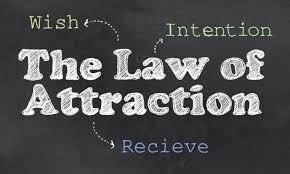 So much is said these days about the so-called "Law of Attraction" that I have to clarify my point of view. In fact, I wrote a post for today about "Positive Pessimism" that I'm delaying until tomorrow so I can address this subject first.
So much is said these days about the so-called "Law of Attraction" that I have to clarify my point of view. In fact, I wrote a post for today about "Positive Pessimism" that I'm delaying until tomorrow so I can address this subject first.
I get the appeal of this so-called "law." It's simple, it's straightforward and it's seductive. All you have to do is get your thoughts focused and "Presto!" you get what you want.

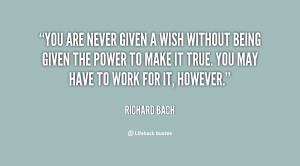
With messages like: "Seek and ye shall find," "Ask and it is given," and "You are never given a wish without being given the power to make it true," it's easy to get sucked into the rhetoric. To buy into the "dream."
Sorry to burst that bubble, but life just doesn't work that way.
Here's the part of it that DOES work: What you focus on, you "attract." Well, in a way. If you look for good things, you'll see more good things. If you look for the best in people, that's what you will find. The converse is, of course, true. If you look for the worst, if you complain about your problems you'll have (or at least see) more problems. And if you look for synchronicities and serendipities and connections, you'll likely find them. That part is spot-on.
But when "they" (whoever "they" is) say that if you want something bad enough, if you keep focused and positive, you'll get "it," well, that's not how things work. And when they say it's a "law," well, that part really bristles the hair on the back of my neck.
Even if it is a kind of "law," there are other laws. And laws with more impact. Like the Law of Karma for example. And whether it's been defined as a "law" or not, Destiny is a much more influential law than the "law of attraction."
For example, if something is not in your destiny, and/or if it's not for your highest good, then you can wish-wish-wish (or even work-work-work) all you want, but it's very unlikely you'll get it. And if for some reason you do, you'll find out that it wasn't all you thought it would be. (Which is probably the lesson – to be careful what you ask for).
The key, really, is to get your wishes in alignment with your destiny – and with the Divine, not to make sure your destiny is in alignment with your wishes. Said another way, to try to make sure what you're asking for is what's best for you. And sometimes what's "best" isn't fun. Or easy. Or particularly pleasant.
We decide on our lessons
The paths we will take
Awards we might go for
And mistakes we might make
For life isn't easy
And not always fun
But easy is boring
Like games always won
(from my children's book, "Sometimes I Wonder."
We're here to learn and grow and, hopefully, contribute. To look for the joy and fun and happiness and peace; sure. Of course. But to expect it 24-7-365? To think all we have to do is wish for it and we'll get that Ferrari or miracle cure or multi-millon dollar book deal?
Look – if it happens for you – GREAT! I'll be cheering you on. I'm just saying that for most of us, life isn't that easy.
And that can be a good thing.
Synchronicities
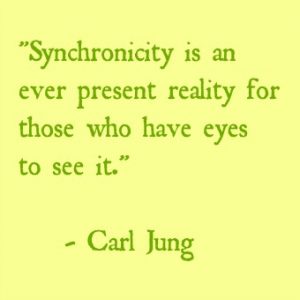
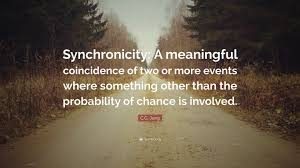 More "JMO" posts coming later. Since this blog is, really, supposed to be about my life in Aspen and since I had an eventful week, this post is part "week in review" and part about the synchronicities that happened throughout.
More "JMO" posts coming later. Since this blog is, really, supposed to be about my life in Aspen and since I had an eventful week, this post is part "week in review" and part about the synchronicities that happened throughout.
What is "synchronicity?"
It's a concept "invented" by Carl Jung suggests basically that things that appear to be unrelated actually are. Of course, it could be a self-fulfilling prophecy for those of us in the world who are looking for it. Sometimes it appears as doors opening from sources you didn't expect. Like tiny miracles out of nowhere. Which is actually more "serendipity" than "synchronicity," though I assert there's a relationship between the two concepts.
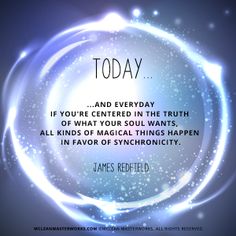
 Serendipities are "happy accidents." They also appear "out of nowthere" yet are also have a connection and/or benefit to you.
Serendipities are "happy accidents." They also appear "out of nowthere" yet are also have a connection and/or benefit to you.
I'm not sure of the Venn Diagram for these two concepts, but I'm sure there's an overlap. I'm just not sure if one is inside the other completely. Hmmm…
Anyway, this week was chock-full of them, partially (or mostly?) because I got out. A lot. Here's a recap:
Monday night I went to a lecture on "Environmentalism in the Trump Era" and met a new, fascinating friend who I saw again Thursday night.
Tuesday night I attended a talk by the Aspen Entrepreneurs by an "Undercover Angel," and re-ignitied a connection that continued on Wednesday and could open up an opportunity for my DrawSuccess business.
Wednesday night was a series of talks by the Aspen Center for Physics, talking about String Theory and Geometry in Physics where I met another new friend. The next day we went to the Aspen Institute to hear the curator tell the story of the art and history of my newly adopted home town.
That experience was a plethora of synchronicities. First of all, the Herbert Bayer artwork had so many synergies with the diagrams used in the Physics lecture. Mind-blowingly similar. Then when the curator talked about Bayer's emigration to the US during WWII I was struck with the similarities with a friend's play about Henri Matisse (who I helped with some edits for the second act of the play). So I helped facilitate that connection – which could lead to a performance of her play here in Aspen. (So far it's only been performed in London).
And to top it off, a possible door opened to bring alive my "50 Ways to Innovate" concept I'd been wanting to pursure with the Institute.
What will happen going forward? I won't speculate. I will say that I've been exploring the concept of "Positive Pessimism," and think it's time to write a blog about that.
Now… to return to the music tradition of my previous blogs…
JMO, Part 4: Education and College
 As I write these blog posts, I realize how many of these issues intertwine. The Wage Gap with Jobs with Immigration and, now, with Education. So forgive me if I repeat myself or make the same point more than once.
As I write these blog posts, I realize how many of these issues intertwine. The Wage Gap with Jobs with Immigration and, now, with Education. So forgive me if I repeat myself or make the same point more than once.
That is, if anyone's "listening" anyway.
Yesterday I talked about how I think it's the responsibility for the government to create an economy so that there are enough jobs to support the everyone willing and able to work. I also said that I belive it is (or should be) the responsibility of the education system to teach the subjects and skills that fit the needs of the marketplace. To educate people to fill – and keep – the jobs needed now and in the future.
Yet here's the problem: the education system isn't set up to prepare people to work and fill jobs. And it doesn't do nearly a good enough job to set up to create new jobs for the future.
In the corporate training world, skills like interviewing, getting along with others, teamwork, communication, conflict resolution and the like are considered "soft skills." The term alone implies weakness. And it CERTAINLY implies "optional" if not "unnecessary."
How sad is that?
Not as sad as when you consider how the education system barely even addresses these issues. They "teach" kids to sit still and be quiet for hours a day while they memorize useless facts that won't help them one iota in the "real world." Sorry to be so harsh – but this is my blog and I feel the need to make bold statements to focus attention on the issues.
I'm not going to address the issues of the current administration other than to say that I have zero optimism they'll improve things one iota; and, instead, I'm convinced that things will get worse if only because of all the other problems they'll cause that these issues I'm identifying will be ignored completely.
So what IS the solution?
As I said in the other post, people get and take jobs based on skills and specifics and they lose and leave jobs based on personalities and relationships.
Those "soft skills" I'm talking about. They're what makes people lose – or leave – jobs. They can't get along with others. They don't know how to contribute ideas. They have terrible communication skills – verbally and in writing. And, no, you don't learn this from a creative writing course. Although teaching and learning creativity is important, too. Just in a different way, for different reasons.
I also proposed that I am in agreement with free college – with some parameters. Colleges must not only teach these skills (which should also be taught in grade schools and middle and high schools), they also need to change the curriculum in order to meet the demands of the job market.
Some of you might argue, "then let's get rid of majors in Sixteenth Century Russian Poetry or Art History or some other major where there isn't exactly a booming job market."
Maybe. But I'm not sure that's the answer. I've read some articles suggesting that a Liberal Arts major or college might be the best at preparing students for a job or career. The question I'm proposing is that no matter what their degree, the students need to be EMPLOYABLE. Not just to get the job, but to keep the job. To do this, they need to learn:
- Creative thinking and problem-solving
- Decision-making
- Communication – written and verbal
- Conflict resolution
- Teamwork
- Efficiency and Productivity
- Accountability
- And I'm sure there are others to add to the list.
I also think people should graduate from high school with proficiency not just in math, but how to manage their finances. Not just in English, but in how to write a persuasive email. Not just in physical education, but in how to stay fit and prevent illness.
A Hermit Gets Out
 I'm taking a break in my political posts today to get back to a reflection on life in Aspen.
I'm taking a break in my political posts today to get back to a reflection on life in Aspen.
Last night I went to an event entitled "Environmentalism in the Trump Era."
Tonight I'm going to an Aspen Entrepreneurs event about philanthropic investing.
Wednesday night I'm going to try to attend two events – one is a discussion on Physics from the Aspen Center for Physics and the other is an author talking about his book about William Glasser.
Thursday there are also two other options.
All are free. All are within a 10 minute walk.
After reading and studying more on Archetypes, I conclude that I do, indeed, have many of the characteristics of a Hermit. Both bad and good. Or, as they say, both in the light and in the shadows. I googled it and found out more enlightening information… http://susannabarlow.com/on-archetypes/the-hermit-archetype/ . Look at the reference to forests and caves. (Remember my post about living in a cave?) Moving here certainly fits my archetype. Although interestingly it's easier to retreat in a large city than a small town. Which is both good and bad for my living here.
Like last night when I made a comment at the meeting on environmentalism. I felt compelled to say what everyone was thinking but not saying, and yet now I'm not so invisible. Especially here.
Is that good? Or bad?
JMO, Part 3: Jobs
 In a previous post I talked about how I used to be a Young Republican – before there was so much blatant corruption in the party. One of the big reasons was that I believed in supporting business in order to create jobs instead of paying people not to work.
In a previous post I talked about how I used to be a Young Republican – before there was so much blatant corruption in the party. One of the big reasons was that I believed in supporting business in order to create jobs instead of paying people not to work.
First, let me propopse something clearly. Something RADICAL.
I BELIEVE it should be the responsibility of the government to produce an economy so that there are enough jobs to support the everyone willing and able to work.
Pretty radical idea, right?
Radical, but logical.
Here's another one: I belive it is (or should be) the responsibility of the education system to teach the subjects and skills that fit the needs of the marketplace. To educate people to fill – and keep – the jobs needed now and in the future.
What do I mean about "and keep?" Let me be clear about one of my firmest beliefs: People get and take jobs based on skills and specifics. But they lose and leave jobs based on people and relationships. What does this mean?
Let me say it again. People get and take jobs based on skills and specifics. They get a job if they have the qualifications to do the job, and they take a job based on the salary and benefits and other specifics.
And they lose or leave jobs based on people and relationships.
Let's break it down. You get a job making widgets if you know how to make widgets. You take a job making widgets when an employer pays you a fair wage (and other benefits) to make those widgets. Want to make more money? Make better – or more widgets. Or make something else with your special skills and experience and education that produces more income than widgets. Economics 101.
But what about the second part? That people lose and leave jobs based on people and relationships. Let's break that down, too.
You might be great at making widgets. But what if you come in late, leave early or take a lot of breaks and don't make as many widgets per hour as what they're paying you to do? Or what if you're difficult to work with? If you yell at your fellow employees? If you make a pass or snide comment at a co-worker who now can't do her or his job because of you? Or vice-versa? What happens then? You – or they – leave (or are asked to leave), and the employer has to lose productivity due to the problem and then they need to spend time and resources to hire someone else.
So, what should be done? What are some solutions?
- First, we should offer mandatory education on people skills (yes, like DrawSuccess). Things like How to get along with others. How to manage conflict. How to negotiate. How to share ideas. How to collaborate. How to work as a team. How to motivate yourself and others.
- Also offer mandatory education on money management. So people can learn how to manage their expenses related to their income and avoid debt. Too much of our population is in denial, especially related to credit card debt. To quote a favorite movie, "We buy things we don't need with money we don't have to impress people we don't like." Too many people are also programmed to feel like they "deserve" things they don't need or haven't worked for. So this training on money management also needs to include understanding and controlling these impulses.
- Offer free college – for the positions we need filled – now and in the future. But not for others. If you want to learn something that doesn't add to the economy, great! Go for it! But don't expect the government/taxpayers to pay for it.
- So – what adds to the economy? What produces a nation that's not only self-sufficient but also poised for growth and improvement? There are experts with those projections. And here are a few of my own suggestions.
- Stop teaching memorization. We now have access to information at our fingertips. Memorizing facts is a waste of time – and brain power. When you hire someone for a job, you don't hire them if they know the date Hitler was elected. You do hire them if they know how to recognize and avoid a potentially destructive decision or practice.
- Teach ways to THINK. To SOLVE PROBEMS. To BE CREATIVE. To INNOVATE. To PREPARE for the future. I don't care if you're studying underwater basket weaving or 19th century Russian poetry or business, if you can learn how to think or see things creatively, you're poised to make a significant contribution to society.
- Also enhance programs that teach independence and entreprenership. Everyone – EVERYONE – should have skills that they can market outside of their jobs, either as a second income or as a back-up plan if they lose their jobs. Or if they want that wide-screen TV they can't previously afford without putting it on a credit card.
- Study Ricardo Semler. His programs for turning employees into independent entrepreneurs are breakthrough and brilliant. The clearest case of "everybody wins" I've ever seen. Certainly more inventive than anything I learned getting my MBA.
- Balance the tax plans and incentives (see Taxes in a future post) so that entrepreneurs and small businesses are encouraged to grow. It's ridiculous that big companies get all the breaks while the rate for small businesses and independent contrators is so high for so many people. Crazy.
- It's also crazy that governments are talking about "bringing back" jobs that are based on a dying element of the economy instead of new, emerging industries.
Some other thoughts:
Note that I did NOT say that it's the role of the government to employ these people directly. For the most part, I'm in favor of capitalism and not in government employment. Capitalism (when it's not corrupt) works better. It allows for independence and competition fair pricing. I'll repeat: when it's not corrupt. When big-money doesn't "buy" politiicans who vote to keep the rich people richer – especially at the expense of the future of the country.
We need to fix the wage gap. Give companies incentives for keeping the wage gap below X times the average worker. This not only "spreads the wealth" – it also makes the company healthier. Paying a CEO more doesn't make the company wealthier. Stock options are fine – at current market rate. Having employees making a higher ratio helps the overall economy. It also promotes longevity and loyalty. (See previous post on the Wage Gap).
Note that my assertion at the top of this post says, "support" everyone willing and able to work. It does not say "live a life of luxury" on minimum wage. It doesn't mean a luxury apartment, state-of-the-art cell phone, widescreen TV, and $100 sneakers.
On raising the minimum wage: We have to keep in mind the impact on small business owners. I know when I had my restaurant I DID pay my workers way over the minimum wage – but there was no way I could afford to pay them $15 an hour. (To put it into perspective, this was over 10 years ago). I would have gone out of business much sooner than I did! I'm not sure of the solution, but to expect these mom-and-pop businesses – especially restaurants and small retailers who struggle enough as it is – to pay their employees an inflated rate for the work they deliver isn't the answer. A lot of "liberals" might argue with me on this – but they're not seeing the bigger picture. Like all the small business owners who risk everything day in and day out (and work a LOT more than 40 hours a week) that would go out of business if the minimum wage gets raised too high to sustain the business.
Some of the advocates for increasing the minimum wage exclaim, "just raise your prices to cover the increase in wages." This is another naive claim. Most small businesses are under enormous pressure to stay competitive vs. the "big guys" as it is. Their margins are already a fraction of the chain stores, who have enormous buying power. So when minimum wage is increased too high, be prepared for (a) a lot of small businesses to go out of business, putting more pressure on the job market and (b) a lot more chain stores, which usually offer lower quality, highly processed foods/products and fewer healthy/quality options (often originally made in countries with lower standards of employee care, pay and benefits).
And there goes not only the middle class (of which a large proportion includes small business owners), there also goes the opportunities for people to go into business on their own, forcing them to find jobs instead of building their own American Dream.
I know this will be controversial to soooo many people, but so be it. If you can't afford to have a widescreen TV without putting it on a credit card, you probably shouldn't get a widescreen TV. If you can't afford to have children, you shouldn't have children. One person – or an entire economy – shouldn't have to pay for another's indulgence. We shouldn't expect a small business owner to pay an hourly worker enough to afford a 2-bedroom apartment on their own. While I agree that everyone should have a safe and clean place to live, not everyone at the lowest wages should feel entitled to live in luxury.
I stated that it's the government's responsibility to produce an economy so that there are enough jobs to support everyone willing and able to work. But what about…?
… Those unwilling or unable to work? Not everyone is "employable."
Some are unwilling. Many people think they "deserve" higher-paying jobs than they are willing to work for. And by being willing to work, I mean not willing to be educated, not willing to risk, not willing to work harder or longer. People are physically and mentally capable, but who have a sense of entitlement, who expect something for nothing. Sorry – no sympathy for them. No taxpayer money to support them. Want to get re-educated? Learn a new skill to prepare you for future employment? Want to go out on your own and start a business? Great. Yes. I support those programs 100%.
Some of these "unemployables" don't have the emotional intelligence to get and keep jobs. I've addressed this issue with solutions above.
And some are delusional and living in the past. They seem to think the same jobs that were around 20, 30, 50 years ago should come back for them. Not sure what to do about any of these people. But I do know it's unfair to expect the government/taxpayers to support them. I'm all for programs to help them get re-educated. For sure! But to think that our economy will go back to horse-and-buggy days is not going to work.
What about immigration? Don't forget – we wouldn't have illegal immigrants if there weren't jobs for them. If citizens wanted those jobs, they wouldn't be available to the illegals. (Except in the situations where the employers are trying to get away with breaking the law so they can pay people below the minimum wage or without benefits. And these employers belong in JAIL.)
So – if the government has 200 million employable people and 200 million jobs, then the question is – how are those jobs allocated? What happens to the jobs that "no one wants?" I think I've addressed some of these. I'm sure there are more solutions I haven't considered. And probably more challenges, too. But this proposal is at least a start.
JMO, Part 2C: The Wage Gap
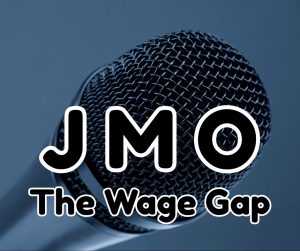 In this post, I'll address the Wage Gap – it's influence and a suggested solution.
In this post, I'll address the Wage Gap – it's influence and a suggested solution.
It doesn't take a genius to figure out the rich are getting richer – and the poor are getting poorer. Which means the middle class is shrinking.
Some politicians want to play Robin Hood, taking from the rich to pay the poor.
And others are paid off by the rich to cut benefits to the poor while reducing taxes for the rich and supporting industries that the rich have invested in, like oil, defense, guns and tobacco. You know – the industries that are destroying our planet.
Certainly the latter is more destructive than the former. But the Robin Hood approach isn't always the way to go either.
Shouldn't there be a middle ground somewhere? A way for all ethical people to "win" while allowing our planet to survive? A way for people earn a decent living, whether they're a worker or a small business employer?
Other posts discuss the challenges with jobs and taxes. Here I want to offer one simple solution: Offer government incentives to companies that keep the wage gap between the highest paid and the lowest paid workers under a certain multiplier. I don't know the right formula – I'll let the mathemeticians and economists work that out. It has to be enough to be worth it, but not more than we can afford.
What's the rationale for this proposal? Offering an incentive to minimize the gap would have impact in several areas…
First, it would call attention to those companies who have a significant gap. If they're privately held, then it would be up to the owner to decide whether they want the tax incentive – or not. But if the company is publically held, the Board of Directors and stockholders would have an incentive to hire and manage CEO compensation within the parameters. Not only the incentive to not pay over-inflated salaries to these executives, but also the incentive to be on the list of the companies that earned this tax benefit. Certainly investors would want to add this information to the list of criteria like EBITA and P/E ratio.
In order to minimize the gap, the company would also have the option of increasing the pay of the lowest-paid workers. Nothing wrong with that! Happier, more loyal employees! It could also free-up some money to go toward innovation and job creation. You know, to actually enhance the future of the company.
As a comment from personal experience, I remember when I worked for Kodak. The company was imploding, laying of 1/5 of the employees at least once a year (at the time). Yet they paid the CEO $40 million that year. No, I'm not kidding. Think of the jobs that one salary could have saved! Or perhaps use that money to help find ways for the company to grow instead of decline. But we all know "the rest of the story" there, don't we?
The downside of this proposal? Of course, the tax break has to be funded somehow. I have my own thoughts (like less money spent on wars and oil and tobacco and guns and fewer tax breaks on the companies that fuel these things) but that's for another day.
For more about the Wage Gap, Jobs and the Minimum Wage, see tomorrow's post.
JMO, Part 2B: More on Campaign Financing and Corporate Corruption
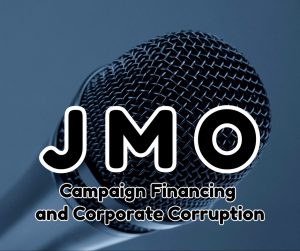 Yesterday I talked about the corruption happening between politicians and corporations and special interests – and how it's destroying our nation, our planet and our values.
Yesterday I talked about the corruption happening between politicians and corporations and special interests – and how it's destroying our nation, our planet and our values.
It's like an addiction. The more money made, the more spent to support politicians so they can make more money. The more addictive the substance, the more drug pushers there are to keep you hooked.
Today I want to talk about patents, monopolies and capitalism – and how they all work together – and against each other (and us).
Capitalism at it's core is not a bad system. It's actually kind of great. It fosters competition, which is also great. And it has a self-regulating system. Let's say I want to start baking cakes. If I can make a great cake, and there are people who want cakes, then there's a market. If my cakes are better than the competition, or if I offer an additional service, like delivery, then I can charge more. If I charge too much, then someone else can start making cakes and take business away from me. If I don't want to deliver outside a particular area, or make a particular kind of cake, then someone else can take over that part of the business. No need for government involvement at all.
Now let's say I come up with a special recipe – a very special recipe – and patent it. I'm the only one who can make that particular kind of cake. If I go to the trouble to invent it, test it, patent it and market it, if it's unique enough, I have the to "own" it. Which means I'm the only one who can market/sell that particular kind of cake. Tough noogies on the competition. They can invent their own kind of cake.
Now let's suppose there's an ingredient or combination of ingredients in this cake that cures hiccups. Now my invention is worth even more. And I can charge more. So far so good. Except…
If this cake is the only cure for hiccups. Or the only one with no side effects. And let's say hiccups are a chronic, terminal illness and this cake recipe is the miracle cure. Now what?
Now this is inviting government intervention. Basically, the government should give me two options. Either I'm forced to share my patent, or I'm forced to reduce my price (margin) to make it affordable. Of course, I should still be allowed to have a fair margin on my product. Otherwise, why would I go to the trouble to invent and test a new product at all?
What's a "fair margin," you ask? See tomorrow's blog for more on that. Let's go back to the issue being discussed.
The problem now is that the system isn't working, and it's inviting corruption – on both political sides. Now, I have the option, as the company owner, of paying off politicians who support my right to keep my patent and charge whatever I want (and not really care about the people who are suffering or die from hiccups). (The Republican approach). Or the government would propose to take taxpayer money to offer the "cake cure" to the people who need it. (The Democratic approach). Neither is a good option – especially when one of the first two options are waaay more logical.
In a future post, see my thoughts – and solution – on the Wage Gap and corporate responsibility.